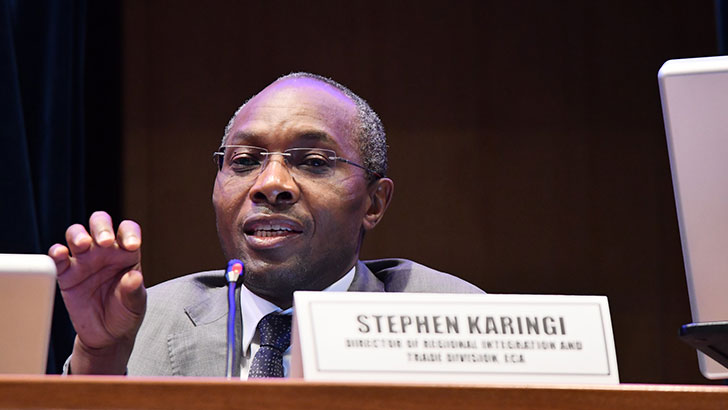Covid-19 hampering regional integration
The Covid-19 pandemic continues to severely disrupt the implementation of Africa’s regional integration initiatives, including the African Continental Free Trade Area (AfCFTA), Director of Regional Integration and Trade Division of the Economic Commission for Africa (ECA), Stephen Karingi, has said.
Presenting the report during the 39th ECA Committee of Experts of the Conference of African Ministers of Finance, Planning and Economic Development, currently underway in Addis Ababa, Ethiopia, Karingi said the situation has been worsened by border closures.
But, apart from Covid-19, Karingi added that regional integration is also being hampered by governance, peace and security challenges.

The ECA report on findings on progress made on regional integration in the context of the Covid-19 pandemic has revealed that Africa lags behind in trading within its borders as much of its trading is outside the continent with European Union (EU) taking the largest share of the market accounting for 29.8 per cent of total trade in 2018.
While progress continues to be made in pursuit of the continent’s regional integration agenda throughout the eight Regional Economic Communities (RECs), challenges to the achievement of deeper integration remained. In particular, most RECs and member States are struggling to achieve progress in the area of productive integration.
Karingi noted that before the COVID-19 pandemic there was a rise in intra-trade in Africa, but compared to other regions, it remained low.
“Trade, economic movement of people and services, infrastructure, governance, peace and security are the key pillars of regional integration,” he noted, adding that many countries were doing a lot to implement the AfCFTA.
He further said that peace and security create environments conducive to the pursuit of regional integration and the attainment of broader continental development objectives.
The ECA Director said that progress on integration was uneven, adding the free movement of people was critical for the realization of the AfCTA.
The ECA report shows that in 2018, Africa accounted for only 2.6% of global trade which is a slight increase from 0.2% from 2017.
Intra-African trade increased to 16.1% in 2018 ($159.1bn), up from 15.5% in 2017. Globally, output slightly decreased to 3.6% in 2018 from 3.8% in 2017.
The report presents an assessment of progress on regional integration in Africa with a particular focus on progress made by RECs in key dimensions of regional integration, including macroeconomic integration; productive integration; trade integration; infrastructure integration; the free movement of people; and governance, peace and security.
In all the RECs, Karingi said, productive integration was their poorest performing dimension of regional integration.
“Most of the communities are lagging in terms of intra-regional intermediate exports and imports, and are recording a very low merchandise trade complementarity index,” he said, adding that productive integration was central to enhancing industrialization and trade.
“Productive integration is also critical to integrating African economies into regional value chains and global value chains, as envisioned in Agenda 2063,” he said.
According to the report, the Arab Maghreb Union (AMU) and East African Community (EAC) are taking the lead in productive integration, with index scores of 0.449 and 0.434, respectively, while ECOWAS is the least integrated regional bloc in the productive integration dimension, with an index score of 0.220.
Despite the low performance of the majority of the RECs on productive integration, there were several initiatives being carried out to improve the situation, including some that are supported by ECA.
Economic Community of Central African States (ECCAS) and EAC are the highest-performing communities in terms of macroeconomic integration, with scores of 0.684 and 0.660, respectively, on the index
Karingi said the ECA will continue to support RECs in mainstreaming and boosting intra-African trade in their programmes and policies, building on the collaborative work on regional industrialization, as has already been initiated in SADC and ECOWAS; broaden its capacity-building programme on the use of macroeconomic and forecasting models in economic planning and development, to empower member States and RECs; support the AfCFTA ratification drive and implementation, including through awareness-raising programmes and developing national implementation strategies.
The Conference of African Ministers of Finance, Planning and Economic Development which started on March 17, 2021 and is expected to close on Tuesday March 23, 202, is being held under the theme; Africa’s Sustainable Industrialization and Diversification in the Digital Era in the Context of Covid-19.





